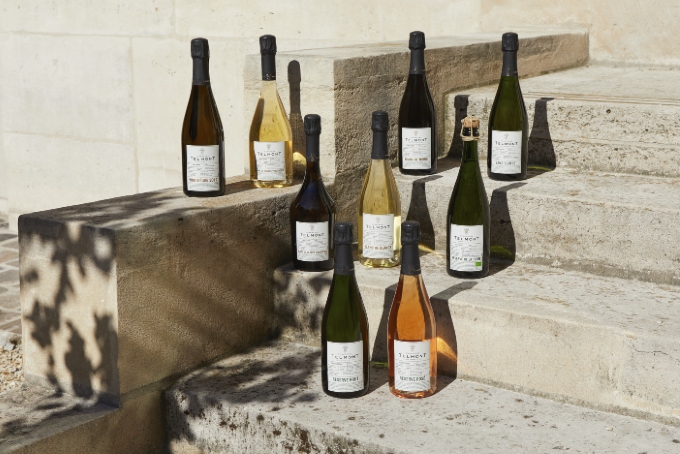Did you know that only 3 percent of all Champagne production is organic? Ludovic du Plessis, president of the House of Telmont, explains that although organic agriculture–no herbicides, pesticides or chemical fertiliser–is desirable to the consumer, it presents difficult challenges for the producer.
In 2021 for instance, organic crops in Champagne were ravaged by the worst mildew in years, alongside frost and excessive rain. Without chemical intervention, Champagne Telmont’s team had to work tirelessly to save what they could, resulting in a smaller organic crop harvest. That’s what it means to work with nature instead of trying to control it.

If any company knows the value of walking the talk, that would be Rémy Cointreau, which bought a controlling stake in fourth-generation Champagne Telmont in 2020. Remy’s tagline of ‘Time, Terroir and People’ dovetails neatly with Telmont’s new programme, In Nomine Terrae–in the name of mother nature.
In conjunction with the brand’s launch in Singapore this November, Ludovic du Plessis shares how the partnership came about, and why environmental action is more urgent than ever.
Champagne is a large, historic region with over 280 producers. Why Telmont?
Telmont attracted the Group on every level as they are a family business since 1912, with the vision, passion and savoir-faire of their predecessors. Under fourth-generation Bertrand Lhôpital, cellar master and head of viticulture, the family had already started the organic conversion of their estate since 2014.

What role did you play in this process?
After Dom Pérignon and Moët & Chandon, I joined Louis XIII Cognac as global executive director. After six years working with Louis XIII, I was eager to once again get involved in Champagne, to start a lifetime project–a business with purpose and for good. I identified the House of Telmont in 2019 (then known as J. de Telmont). I was lucky to instantly have the full support of the Group who invested by my side. I therefore became an entrepreneur within the Rémy Cointreau group.
What makes Telmont so special?
Personally, my first tasting experience of Telmont Champagne was a complete epiphany. The wines have a unique personality, presence, complexity and maturity, all the while preserving a striking ethereality. We speak often of the Telmont paradox; they are structured yet remarkably airy on the palate.

Who is the Telmont audience?
I would say that the Telmont client is a connoisseur, enjoys high quality wines and finds value in purpose-driven brands, even if this means an alternative choice vs. mainstream. Our consumer doesn’t shy away from trying new brands and breaking from the status-quo.
How is the wine industry in Champagne at this time?
Champagne has survived various crises, more recently with Covid 19 and severe weather conditions. Industry sales remain healthy as forecasts for 2021 indicate a total amount of between 290 million and 300 million bottles, vs 244 million sold in 2020–these numbers show the resiliency of the Champagne category.

To us, sustainability is a priority if we wish to preserve our terroir, our grape quality and keep perpetuating the century-old traditions of Champagne making. Fortunately, it is a vital subject that is being discussed, addressed and researched. We are encouraged by the current shift of mindset in the region with the key players starting to adhere to stricter regulations and stronger sustainability ambitions.
How will “In Nomine Terrae” impact the quality of Telmont’s Champagne?
We firmly believe that our wines will be good if the earth is true, therefore the two go hand in hand. We have set five ambitious sustainability goals:
- Organic conversion: To convert all of our vineyards to 100% organic farming by 2025.
- Stop gift boxes: No more production of gift boxes; the best packaging is no packaging. The way forward is switching to only green bottles. Green bottles are 100% recyclable and made from 85% recycled glass in contrast with clear bottles (0% to 25% recycled glass).
- 100% renewable energy: Green source energy for all our activities.
- Stop air freight: From early 2024, Telmont will be onboard Neoline ships, a company specialising in wind-powered maritime transport. Maritime transport benefits from a lower CO2 emission factor (3 times less than rail transport, 13 times less than trucks and 74 times less than air transport).
- Transparency: our revamped label displays all production-related information and detailed contents at the forefront of bottles.

Do you think customers are increasingly knowledgeable about sustainability?
Recent studies show that over half of respondents in each of the top four global Champagne markets reported that they care if brands they buy are ethically responsible. Thus far, feedback has been incredible. Our clients have expressed strong appreciation for our sustainability objectives and have expected the kind of transparency offered by Telmont for years. At Telmont, we have a foot in tradition and another in modernity, and both firmly rooted in our soil.
Telmont Champagne is available at leading wine retail and select venues in Singapore including Casa Restaurant, Tippling Club and Artemis. Individual bottles of Réserve Brut (RSP S$80/750 ml), Réserve Rosé (RSP S$92/750 ml) will be available for purchase at Bottles & Bottles from 22 November 2021 onwards.





